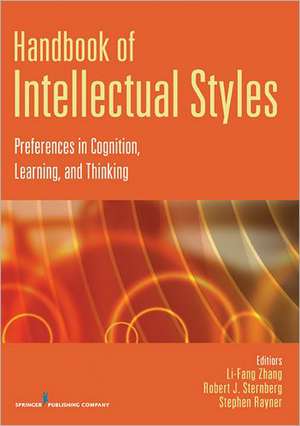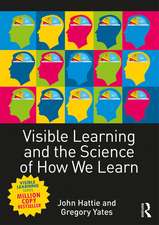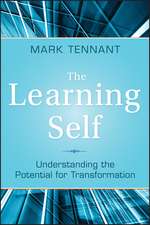Handbook of Intellectual Styles: Preferences in Cognition, Learning, and Thinking
Editat de Robert J. PhD Sternberg, Li-Fang Zhang, Stephen Rayneren Limba Engleză Paperback – 30 sep 2011
B]ecause of the thoroughness of the literature reviews and the comprehensive coverage of the chapter topics, this book] should be required reading for any scholar working in related areas of personality or intelligence."--PsycCRITIQUES
"This book is a masterly attempt to bring order and cohesion to a field that for many years has been riven with claims and counterclaims. The editors and authors are to be congratulated for addressing a very complex task so helpfully."
John Biggs, PhD
Honorary Professor of Psychology
University of Hong Kong
"If you are interested in intellectual stylesopeople's preferred ways of processing informationothen this book belongs on your bookshelf."
Richard E. Mayer, PhD
Professor of Psychology
University of California, Santa Barbara
"For more than half a century, the construct of styleowhether designated as cognitive, thinking or learningohas been in or out of fashion in the history of psychology and education. The editors of the present Handbook have invigorated the style construct in the form of intellectual styles, and have brought together a distinguished international panel of chapter authors who offer up-to-date surveys of the assessment, development, correlates, and educational and organizational applications of intellectual styles. For those seeking to familiarize themselves with current theory and research in an intellectually exciting field, the present Handbook is essential."
Nathan Kogan, PhD
Professor Emeritus, Department of Psychology
New School for Social Research, New York, NY
The concept of intellectual styles has had a controversial history based on diverse philosophical and theoretical foundations. Most recently, the idea of intellectual stylesoan umbrella term that covers such closely related constructs as "cognitive styles," "learning styles," "teaching styles," and "thinking styles"ohas gained momentum as an explanation for why different people succeed in different professional and organizational settings. Previously, it was thought that high-achievers simply had more innate abilities than their less successful peers, but research has shown that individuals have different intellectual styles that are better suited for varying types of contexts and problems.
Based on the most current and expansive research, this handbook is the first to provide a comprehensive review of research on the construct of intellectual style, from its foundations and development, to its relations to allied constructs, its roles in school and job performance, its applications in various populations, and its future.. This understanding of intellectual styles as a valid concept for both individuals and groups has far-reaching implications for researchers in cross-cultural psychology, multicultural education, organizational behavior and work performance, and many other academic disciplines, as well as practitioners in education and beyond. Key Features:
Provides a comprehensive review of intellectual styles from multiple perspectives Written for students and scholars in diverse academic arenas, as well as practitioners in education and other fields Includes contributions from researchers from diverse disciplines, such as psychology, business, education, and health sciences "
Preț: 674.02 lei
Preț vechi: 757.32 lei
-11% Nou
128.97€ • 134.66$ • 106.74£
Carte tipărită la comandă
Livrare economică 04-18 aprilie
Specificații
ISBN-10: 0826106676
Pagini: 448
Dimensiuni: 178 x 251 x 23 mm
Greutate: 0.73 kg
Ediția:New.
Editura: Springer
Textul de pe ultima copertă
""[B]ecause of the thoroughness of the literature reviews and the comprehensive coverage of the chapter topics, [this book] should be required reading for any scholar working in related areas of personality or intelligence.""--PsycCRITIQUES
?This book is a masterly attempt to bring order and cohesion to a field that for many years has been riven with claims and counterclaims. The editors and authors are to be congratulated for addressing a very complex task so helpfully.?
John Biggs, PhD
Honorary Professor of Psychology
University of Hong Kong
?If you are interested in intellectual styles?people's preferred ways of processing information?then this book belongs on your bookshelf.?
Richard E. Mayer, PhD
Professor of Psychology
University of California, Santa Barbara
?For more than half a century, the construct of style?whether designated as cognitive, thinking or learning?has been in or out of fashion in the history of psychology and education. The editors of the present Handbook have invigorated the style construct in the form of intellectual styles, and have brought together a distinguished international panel of chapter authors who offer up-to-date surveys of the assessment, development, correlates, and educational and organizational applications of intellectual styles. For those seeking to familiarize themselves with current theory and research in an intellectually exciting field, the present Handbook is essential.?
Nathan Kogan, PhD
Professor Emeritus, Department of Psychology
New School for Social Research, New York, NY
The concept of intellectual styles has had a controversial history based on diverse philosophical and theoretical foundations. Most recently, the idea of intellectual styles?an umbrella term that covers such closely related constructs as ?cognitive styles, ? ?learning styles, ? ?teaching styles, ? and ?thinking styles has gained momentum as an explanation for why different people succeed in different professional and organizational settings. Previously, it was thought that high-achievers simply had more innate abilities than their less successful peers, but research has shown that individuals have different intellectual styles that are better suited for varying types of contexts and problems.
Based on the most current and expansive research, this handbook is the first to provide a comprehensive review of research on the construct of intellectual style, from its foundations and development, to its relations to allied constructs, its roles in school and job performance, its applications in various populations, and its future.. This understanding of intellectual styles as a valid concept for both individuals and groups has far-reaching implications for researchers in cross-cultural psychology, multicultural education, organizational behavior and work performance, and many other academic disciplines, as well as practitioners in education and beyond. Key Features:
Provides a comprehensive review of intellectual styles from multiple perspectives Written for students and scholars in diverse academic arenas, as well as practitioners in education and other fields Includes contributions from researchers from diverse disciplines, such as psychology, business, education, and health sciences "













